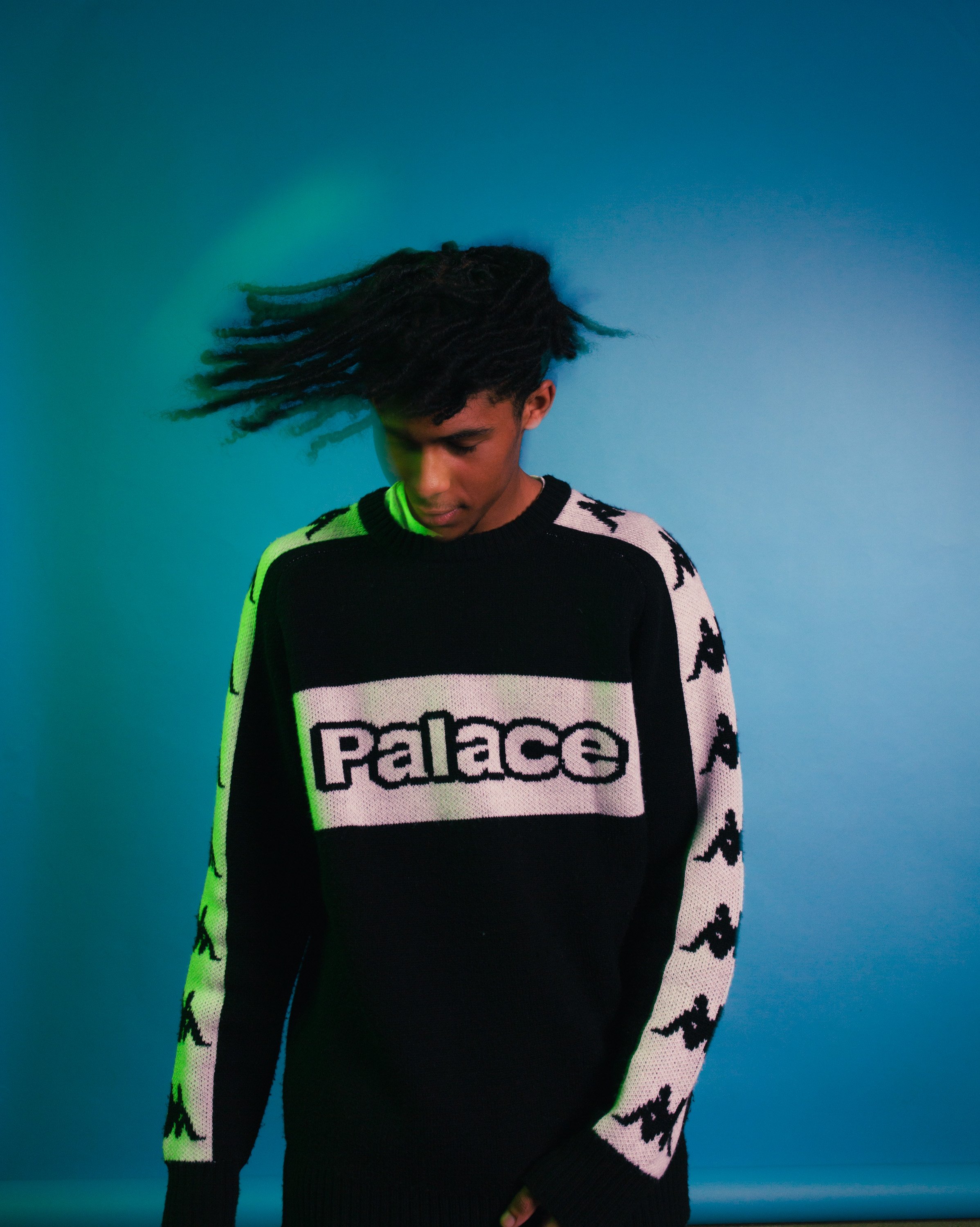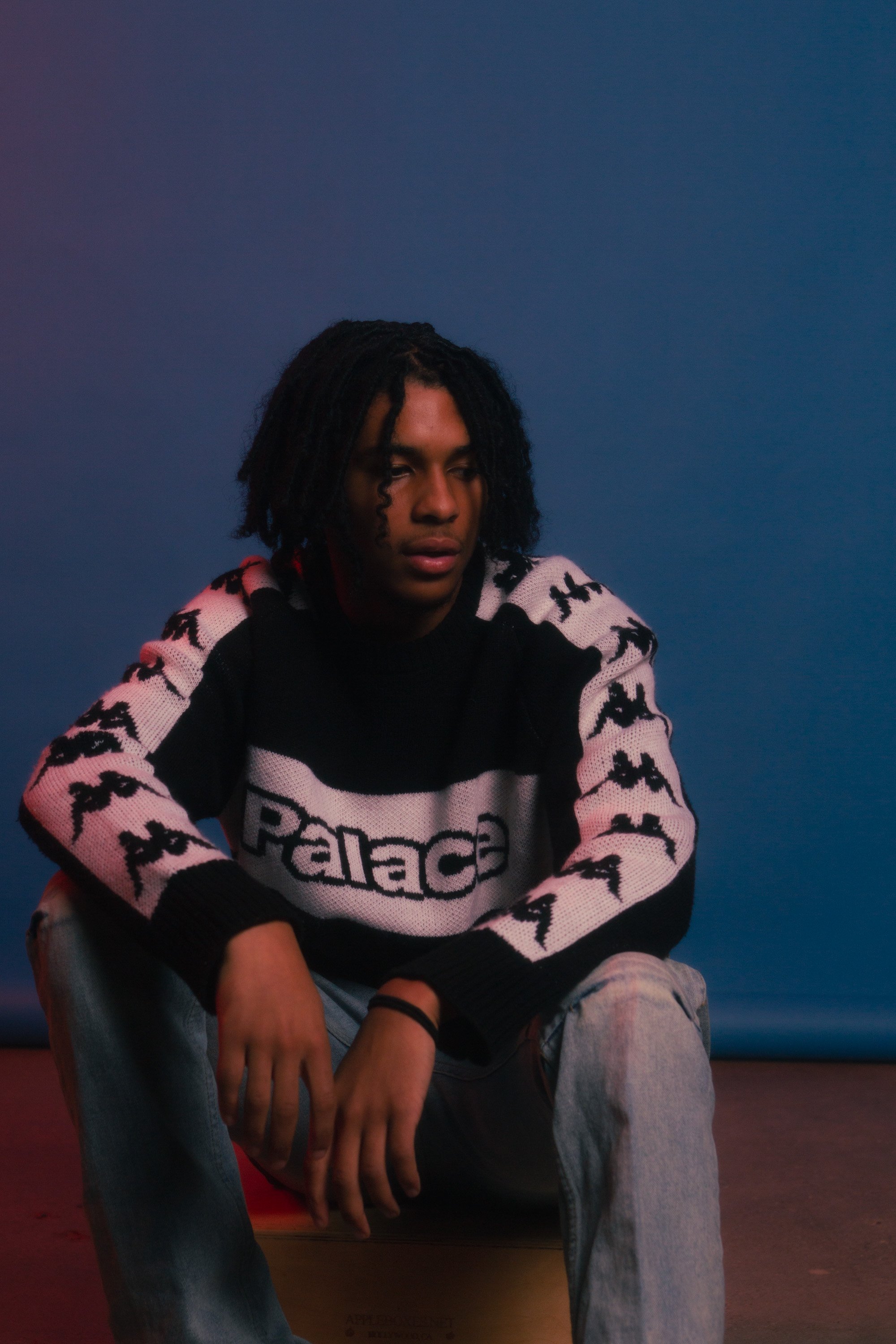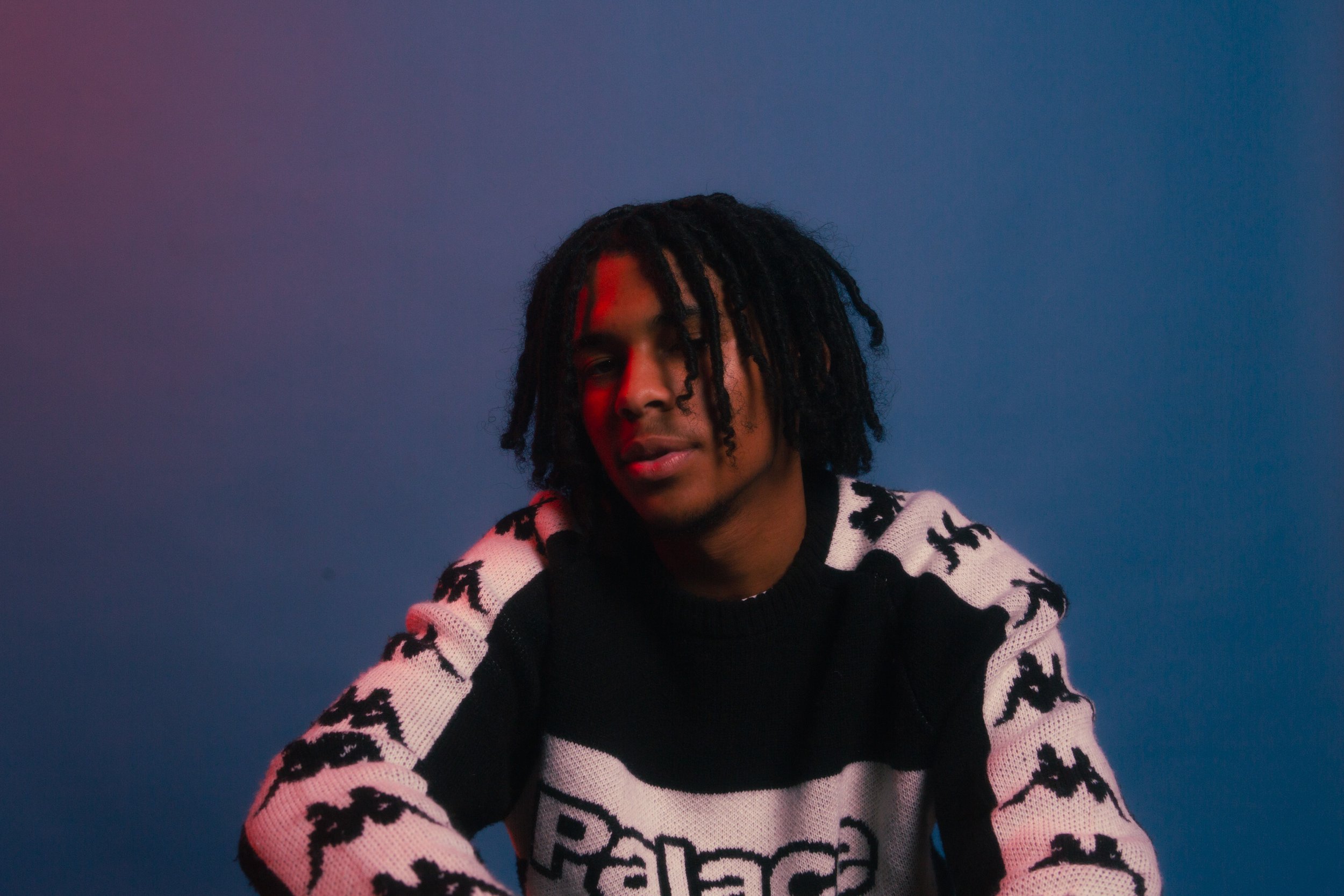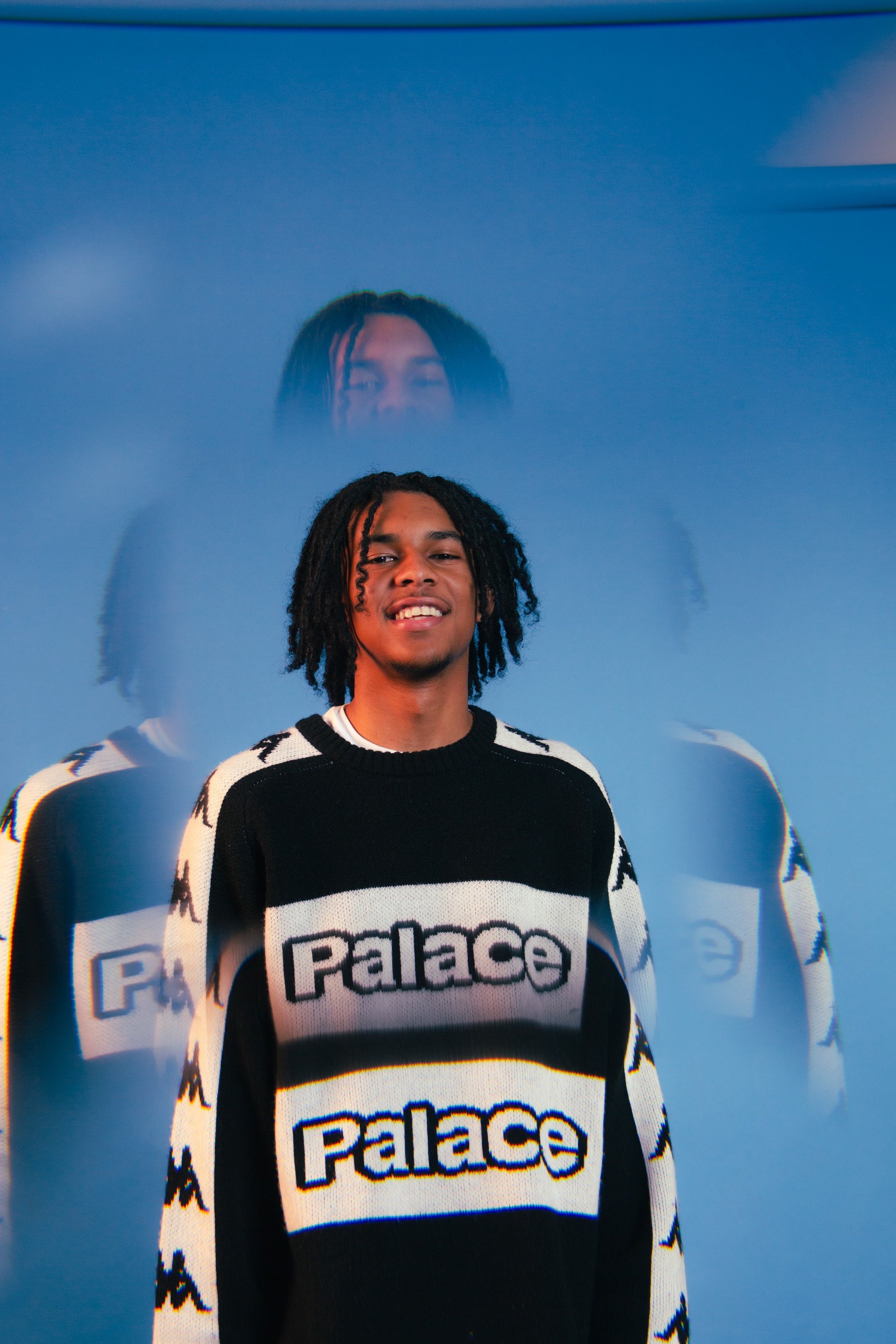From Chicago's Low End to Los Angeles: Jabba44x is Chasing His Dreams
By the time he was three years old, South Side hip-hop artist Jabba44x had already begun charting his path toward a music career. At his third birthday party, he stood up and rapped “Can’t Tell Me Nothing” by Kanye West all the way through, “curse words and all,” after learning the lyrics off of a burnt CD his father had given to him.
In middle school, Jabba spent his weekends honing his skills as a DJ in his father’s office downstairs, going as far as performing at the NBA All-Star Game in Chicago. By high school, Jabba discovered his love of self-expression through words, trading his turntable set for a notepad and microphone.
Jabba started out by writing spoken word poetry, which eventually turned into writing verses to beats he found on Youtube. When the coronavirus pandemic hit, he got his first mic and wrote his first song.
“I used garbage presets on Logic... It was so bad,” Jabba said. “I was trying to sound like Earl Sweatshirt. Earl barely engineers his music; he almost makes it sound rough on purpose.”
When Jabba wasn’t doing music, he was playing basketball. His father, Terry Mister — who briefly played for Paul Westhead at Loyola Marymount University in the late 1980s before dropping out due to injury — was often his head coach. Jabba said his father never made anything easy on the court, even refusing to start him if he wasn’t one of the best players on the team.
Despite this, he credits his basketball career for teaching him the work ethic he would later apply to music.
“Basketball taught me how to work,” Jabba said. “My dad would never give us anything. He always made us play on the worst teams.”
As a sophomore attending Whitney Young High School on Chicago’s Near West Side, Jabba recorded and released his debut project, LOWEND THEoRY, named after The Low End, a neighborhood on the South Side that comprises sections of Bronzeville and Hyde Park.
Sporting a trim runtime of nine songs and 29 minutes, LOWEND THEoRY is a succinct, diaristic account of Jabba’s experiences growing up in the neighborhood that bares the album’s name. Jabba makes his mark, spitting his boastful yet self-reflective lyricism over beats that dwell in a diverse set of sounds, such as washed-out jazz and stripped-back trap.
“The pen getting deadly with every stroke, got ‘em still trippin’ ‘bout the last shit I wrote/In my city tryna be the hope,” Jabba raps on “From The LowEnd With Love,” the album’s opening cut.
Since releasing LOWEND THEoRY in 2021, Jabba quit playing basketball to focus solely on music, graduated from high school and moved to Los Angeles to attend Loyola Marymount University while continuing to chase his dreams.
2023 could be the year that he finally catches up to them.
In April, Jabba plans to release his next project, a batch of recently recorded songs featuring him experimenting with new sounds. After that, he has two more EP’s on the way, the latter of which will serve as a taster to his next full-length project, a “conscious-trap” concept album entitled Prairie Ave.
Jabba recently spoke with These Days about his life and work. An edited transcript follows.
Can you talk about coming up on Chicago’s South Side?
I grew up in Bronzeville on Prairie Avenue. That’s what inspired a lot of my music tastes because my dad is really into music. The basement of his house is basically an office space. He had all his CDs [and] Vinyls. My dad had a CD burner, and that's actually where I got Kanye’s Graduation album. It was burned on a CD [when] I was three years old. Bronzeville at that time was nowhere near what it is now, so my parents weren’t just letting us walk around the neighborhood and hang out.
As I got older, I wouldn't say Bronzeville really changed, [but] now it's a lot better. Once I got closer to my eighth grade year, you [could] walk around and hang out. But we moved to Hyde Park because my parents were tired of [the safety concerns.] Hyde Park is when I kind of came into being Jabba. I played basketball my whole life, but Hyde Park is so art heavy, you're around it all the time. I feel like it inspired me to do my own thing. I still love basketball, but music was what I always had the most love for. My junior year in high school, I quit playing basketball and started rapping, and Hyde Park supported me. I did the Silver Room Block Party, I did Connect Gallery, who was a huge supporter. I had my first ever show at Connect with a full live band.
What is it about Graduation that means so much to you?
It was my first experience with hip-hop that I considered my own. I heard music that was my dad’s, I heard my mom's music. When my dad got me that album, it was the first time that I felt like I owned anything. I felt like it was my own possession. I literally had one CD and it was that album. For two years, it was the only thing I played on repeat. This is before you could stream music; I had a CD player in my room, and I would sit right in front of my CD player and listen to the album on repeat.
You mentioned your Dad having a major influence on you eventually pursuing music. What else were you listening to in those early years besides Kanye?
My dad, he never did anything with music, but he just always loved music. I had access to a crazy library since I was young. I was listening to reggae, I was listening to house music, stuff I didn't even realize I was picking up on and being educated in. It was just second nature because it's what was playing all the time. When it came to hip-hop, hip-hop was what I was drawn to first. I was in third or fourth grade and Nas was my favorite rapper. What really changed everything was when my dad bought me Born Sinner by J. Cole. He let me listen to it, even though that album is probably J. Cole’s raunchiest album in terms of lyrics. My dad thought it was dope. He knew I liked hip-hop and he knew Nas was my favorite rapper, so he put me on to J. Cole. Ever since then, that inspired almost everything I did with rap. I wanted to be better than J. Cole. But now, I feel like I'm moving towards my own sound; I feel like you'll never really be better than your idols if you’re trying to emulate them.
How did you benefit from having an unfiltered listening experience as a music fan from an early age?
Not being censored, it lets you get the full scope of [the artists’] reality. I'm writing a midterm about how hip-hop has served as a medium for people to express their reality when they're going through hardships. I feel like not censoring me, it taught me how to do it. When you hear J. Cole rap “Wet Dreamz,” and I was in fifth grade, I didn't even understand what I was hearing, but the message and the way he was delivering his reality, you understood .. you got what he was talking about. And then when you listen to Nas’ Illmatic, Illmatic was one of the pivotal albums for me. I feel like the clean version, you don't get the full emotion and feeling they bring in their songs .. It makes it so the message doesn't get delivered to the best of its ability.
You also had a love for basketball growing up.
Basketball taught me how to work. My dad would never give us anything, he always made us play on the worst teams. My seventh to eighth grade year, I almost quit because he wouldn't play me. It wasn't even a ‘not being good enough’ thing, my dad was like, ‘nah, I'm not playing you until you’re so good that you're starting and you're the best player on the team. That time in life was honestly some of the most fun I've had so far, just because that was the hardest I've ever worked. It taught me work ethic. I took it for granted in the beginning. I hadn't started taking basketball serious until my dad wouldn't play me. I was so frustrated, I just started putting all my energy [into basketball.] Anytime I wasn't in class, I was in a gym. It taught me how hard you gotta work, and then I started seeing myself get better.
Then I took those ideals and [put them to] music. Music, I look at it like basketball. ‘Why didn't you make it to the NBA?’ Because you didn't work. You weren’t working hard enough from the jump; It was days you was taking off. With music, I'm not giving myself excuses. I'm working. A lot of people look at me like, ‘how have you done certain things already at the age you’re at?’ A lot of people try to push it down as like, ‘you're younger,’ and then they hear me rap and they're like, 'I thought you were way older.’ It's really the amount of time I've spent on music. I wake up every morning to write songs. My mindset, I'm trying to leave no room for failure with this. If I don't make it in music, it’s gonna be no excuse. Music is truly what I love and truly what I wanna do; it’s all I care about. Basketball taught me that work ethic. If you work hard enough, you’re gonna get it, but you got to put in the work.
Can you speak a bit more on how you got into pursuing music?
I started DJing when I was in fifth grade at my uncle’s studio. I watched the Netflix original The Get Down, and they had this dude named Shaolin Fantastic on the show, and he was DJing. It just amazed me; I thought it was the coolest thing ever, so I begged my parents to DJ. One day, I’m at my Uncle’s art studio, and he had his turntables up. And I didn't know what I was doing, [but] he showed me one or two basic things with blending songs. I think I stayed there that day for like six hours just messing around, trying to learn how to do it. I begged my parents for months and months.
Eventually, when I was in sixth grade, my dad bought me the turntables I still have to this day. I just started DJing all the time. My dad's office literally turned into my music studio because I was his DJ down there while he worked. I used to DJ down there all day, 24/7. I would get home from school, DJ until it was dark and I had to go to sleep. Weekends, I’d get up early and DJ till night time. I started getting gigs; I DJ’ed at the NBA All-Star game in Chicago when I was in eighth grade. I feel like it taught me how to control the crowd. Then I just got tired of being behind the boards.
I was like, ‘I want to start making my own music.’ I started writing poetry, and that turned into spoken word. Spoken word turned into me writing to beats on Youtube all the time. I was doing that on and off through my first two years of high school, and then quarantine hit.. I got my first real mic. Once I got the mic, I think I used garbage presets on Logic [Pro], I wrote my first song. It was so bad.. I was trying to sound like Earl Sweatshirt. Earl barely engineers his music. He almost makes it sound rough on purpose. I just used my bad mic and was like, ‘I’m just gonna rap on Earl Sweatshirt type beats.’ I posted my first one on SoundCloud, it hit a thousand views, which at the time seemed like a crazy number. It just motivated me to keep going with music. Eventually, it led to the project and other stuff. I've always been doing something with music, and eventually it just led to rapping because that's what I thought I was best at.
What prompted the move to LA?
Since I was little, I always wanted to be in LA. The first time we ever went to visit my Mom's sister, I kind of just fell in love. When I was in Chicago, it was always my motivation, [to move to LA] like, ‘I'm gonna touch LA. As soon as I touch down, I'm gonna just blow up with music.’ Now that I'm here, I realized I was super naive to what it would really be like. It’s way more work than that. But now that I'm out here, I'm starting to make waves. But those first couple months out here, I was stressed out because I was naive to think I would just touch LA, and all of a sudden, you're famous. Now that I’ve put in the legwork — I've been to a bunch of open mics and have performed — I got my following up out here.
LOWEND THEoRY chronicles your experiences growing up in the two aforementioned neighborhoods. How do the themes and the stories that play out in the music connect on the album?
To be honest, it was less of a theme, and it was more so me just trying to make really dope music talking about my life. I made that album when I was a sophomore in high school, so making that album was more so geared towards wanting to show people I can rap, I could make music. I wanted to share my voice for the first time.
You mentioned the dirtier aesthetics of Earl Sweatshirt’s music and those same aesthetics are heard on LOWEND THEoRY as well. What were you going for with the production on the project?
I’m real sample heavy; I always listen to the sample first. That album, I was just sticking with beats I thought were dope. The dopest beats I could find, would just write over and then put them up.
Does the third EP you plan on dropping tie into the album conceptually in any significant way, or is it more of a teaser?
This is more of a teaser, more so from the sound aspect. The sound has changed and developed a lot. But the EP has a whole concept of its own. It's a lot of stuff planned, a lot of crazy dope people I’m working with. I don't want to leak too much right now, but it's gonna be some crazy stuff coming up.
You refer to Prairie Ave as a “conscious trap” album.
I feel like there’s a disconnect [within hip-hop.] I’ve always loved J. Cole, so I'm always arguing with people. Basically, if somebody listens to Playboi Carti, right, they always be embarrassed. Super Playboi Carti fans, they might respect J. Cole, but it's always like, ‘I can't listen to his music because it's too slow, or it’s not fast enough for me.. I care more about the energy of music.' From being at concerts, I’ve learned energy matters a lot. There's a lot of dudes that aren't necessarily saying that much, but it don't mean that the music isn't dope. Their energy is what makes [the fans] respond.
When you look at people like Yeat, he might not say the most complex bar on the planet, but his energy is what’s gonna carry the song, give you a feeling and make you rock with him. My whole thing is, I’m making music that when you first listen to it, it sounds like, ‘Oh, I'm gonna turn up, get lit to it.' Then when you listen to what I'm really saying, it’s like, ‘Oh, there’s a message to it too. He's not like mumbling and saying nothing at all. Like he's actually saying stuff with substance behind it.' I'm kind of trying to bridge the two worlds. It’s a lot of Travis Scott influence on this album, a lot of Tyler, The Creator, a lot of J. Cole.
Are they dropping this year?
The EP is for sure coming this year. Prairie Ave is coming towards the end of this year.
What else can you say about the concept of Prairie Ave?
I wanted to show my creativity from putting my life experiences into a story. The first song on the album is the end of the album. It’s a song called “Thank you” where he’s basically rapping his whole life out. He says thank you to the world, his goodbye, ‘it’s all ending’ type stuff. The main character dies at the end of the first song. After the character dies, he gets sent to purgatory; he's trying to be reborn into a new soul. But he don't have no money, he's still down on his ass the way he was at the beginning. And so he calls (both things?) incorporated .. it’s basically a hotline to be reborn. The operator is Lucifer. He’s like, ‘you don’t have enough money to be reborn the way you want to live.’ But you can give me your soul, and use it to live whatever life you envision, whatever life you wanted to live, with everybody you thought you wanted.
I went to Whitney [Young High School.] It's a ton of kids that had crazy amount of money. Then when you talk to them, they're depressed because their parents never home, they got drug problems. When you’re on the South Side, you're not hearing [about] kids strung out on cocaine [because they can’t afford it.] But you go to schools in the upper echelon, you start to hear more about kids strung out on cocaine, kids doing pills, all this other stuff because they're depressed. Their family’s not together at home, they got problems going on.
He gives his soul to the devil to be reborn in a life he envisions, so every song is a different life from the outside looking in [that] he thought he had wanted. So once he gets that life, he realizes, ‘oh, it's not everything I thought it was from the outside looking in. It’s good, bad [and] ugly, everything in between I didn't see behind closed doors.’ So he goes through all these different lives and learns these different lessons. Then the end of the story he learns there's no such thing as a life that’s better than your own. He has a full-circle moment where he kind of realizes how it's all coming together.
Any final words for the people?
A lot of dope music on the way. Go stream “3226,” out on everything, go stream LOWEND THEoRY. A lot of new moves, a lot of new shows, a lot of dope stuff going on; make sure you tap in.
* * * *




